To become proficient in playing piano songs, we suggest taking a structured approach. Start by breaking down songs into smaller sections for focused practice. Spend each day working on one section using the loop function. Then, improve your technique through daily scales and dynamics practice. Explore different touches and pedal techniques for adding expression. Lastly, commit to practicing consistently and solicit feedback from mentors or peers. Recording your sessions can help with self-assessment. Establish clear goals for each practice session to boost motivation. By following these steps, you will progress towards mastering piano songs efficiently and effectively. Additional insights are available to those who are eager to enhance their musical abilities.
Key Takeaways
- Break down songs into 4-10 second sections for manageable learning.
- Focus on mastering one section daily for efficient progress.
- Refine technique with scales, arpeggios, and dynamics practice.
- Utilize pedal techniques and study scores for expression.
- Seek feedback, set goals, and practice consistently for mastery.
Song Analysis and Breakdown
Let's break down each song into manageable sections of 4-10 seconds to enhance learning efficiency. When we play piano, diving into Piano Songs in bite-sized pieces allows us to grasp the nuances and intricacies of the music. By focusing on mastering one section per day, we gradually build our skills and understanding of the entire song. Utilizing the loop function on our piano or practice app enables us to repeat and perfect these short segments, ensuring we capture every note and rhythm flawlessly.
Following a structured routine of learning and playing sections incrementally paves the way for steady progress. Each day presents an opportunity to celebrate breakthroughs in mastering these sections, boosting our motivation and confidence. This approach not only enhances our ability to play piano songs effectively but also deepens our appreciation for the music itself. Through this systematic breakdown and analysis, we lay a solid foundation for mastering even the most complex Piano Songs.
Technique Refinement and Dynamics

To refine our piano playing technique and enhance dynamics, daily practice of scales, arpeggios, and hand exercises is essential for improving finger dexterity and control. When it comes to mastering piano songs, focusing on dynamics is key to adding expression and emotion to your performance.
Here are three innovative tips for honing your technique and mastering dynamics:
- Experiment with different touches and pressures on the keys to create a range of dynamics and tones in your music.
- Utilize pedal techniques like sustain, sostenuto, and una corda to enrich the sound and prolong notes for a more immersive musical experience.
- Study the score meticulously, paying attention to markings such as staccato, legato, accents, and phrasing to grasp how to interpret and execute diverse musical nuances effectively.
Consistent Practice and Feedback

Consistent practice and feedback are essential components for mastering piano songs efficiently and effectively. When learning piano, committing to regular practice sessions, even just 20 minutes daily, can greatly improve retention and progress. Additionally, seeking feedback from a teacher, mentor, or peers is vital for identifying areas that need improvement in both song interpretation and technique.
Recording practice sessions is another valuable tool as it allows for self-assessment and the ability to track progress over time. Setting specific goals for each practice session can also enhance focus and motivation, leading to more effective learning.
Frequently Asked Questions
How Do You Master a Song on the Piano?
When mastering a piano song, we break it down into smaller sections to focus on each part. Practicing hands separately before combining them guarantees accuracy and fluency.
Tools like metronomes help maintain consistent tempo and timing. Visualizing the song away from the piano aids in better memorization.
Recording ourselves playing the song helps identify areas for improvement and track progress. These steps are essential for mastering a piano song effectively.
How Do You Master Piano Music?
When mastering piano music, we break it down into smaller parts for focused practice. Practicing each hand separately helps with coordination.
Tools like loop functions and hand symbols aid in efficient learning. Daily progress and small improvements boost motivation.
Consistent practice routines are key to mastering piano songs effectively. By following these steps, we can enhance our piano skills and tackle challenging pieces with confidence.
How Do Pianists Memorize so Many Songs?
When pianists memorize numerous songs, we rely on techniques like breaking music into small sections, repetition, muscle memory, and visualization.
Memory aids such as chord progressions, hand positions, and musical patterns are instrumental in this process.
Playing from memory not only enhances performance quality but also allows for expressive interpretation.
Consistent practice and performance play an important role in reinforcing song memorization and retention among pianists.
How Do Pianists Learn Pieces so Quickly?
We break pieces into manageable sections for focused practice. Utilizing techniques like hand separate practice and deliberate repetition helps us learn efficiently.
Memory aids such as muscle memory and mental practice aid in internalizing music. Years of training enable us to quickly analyze and interpret new pieces.
Effective practice routines and strategies are key to our ability to learn pieces quickly and effectively.
Conclusion
To sum up, mastering piano songs requires dedication and practice. By examining songs, refining techniques, and practicing consistently, you can enhance your skills and become a better pianist.
While it may seem challenging at first, with time and effort, you can achieve your musical goals. Remember, progress takes time, so be patient with yourself and enjoy the journey of learning and growing as a musician.










